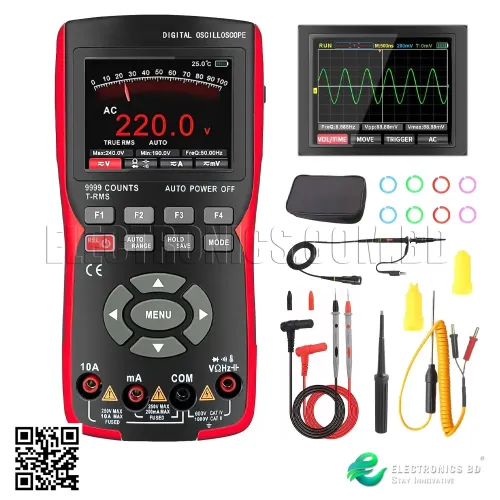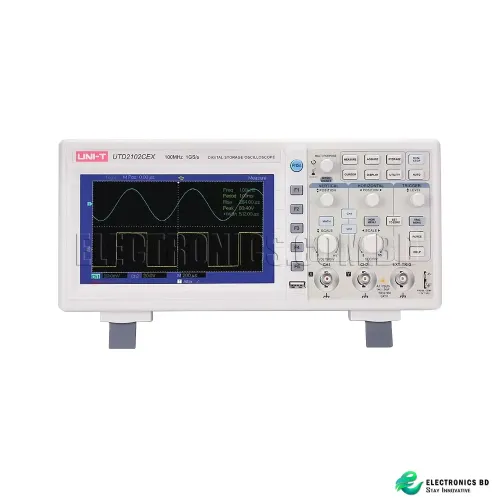ESP8266 WEMOS D1 MINI ESP-12F Z USB-C
- 3D printers & CNC
- Accessories
- Active Components
- All Departments
- CNC Accessories
- Electrical Accessories & IOT
- Latest
- Oscilloscope
- Passive Components
- Projects
- SMD Components
- Socket, Port & Jacks
- Sound Systems
- Drones & RC Hobby
- Sale
Your shopping cart is empty!
Specifications:
- System: ESP8266 in the form of the ESP-12F module
- Flash: 4MB
- Power supply: 3.3V or 5V from the USB port
- Built-in 2.4GHz 802.11 b/g/n WiFi communication
- WiFi modes: AP (Access Point), STA (Standalone), AP+STA
- Supported technologies: TKIP, WEP, CRC, CCMP, WPA/WPA2, WPS
- 11 GPIO pins
- 10 PWM outputs
- 1 analog input (ADC)
- Serial interfaces: UART, I2C, SPI, 1-Wire
- USB Type-C connector for programming and communication
- USB-UART converter on the CH340 chip
- PCB antenna built into the module
- Przysick Reset
- Goldpin raster: 2.54 mm
- Module dimensions: 34 x 25 mm
- Weight: 10 g
Package:
1x ESP8266 WEMOS D1 MINI ESP-12F Z USB-C
Product Description
Features:
- System: ESP8266 with ESP-12F module
- Flash Memory: 4MB
- Power Supply: 3.3V or 5V via USB port
- WiFi: 2.4GHz 802.11 b/g/n with AP, STA, and AP+STA modes
- Security: Supports TKIP, WEP, CRC, CCMP, WPA/WPA2, WPS
- GPIO Pins: 11
- PWM Outputs: 10
- Analog Input: 1 (ADC)
- Serial Interfaces: UART, I2C, SPI, 1-Wire
- USB Connector: USB Type-C for programming and communication
- USB-UART Converter: CH340 chip
- Antenna: Built-in PCB antenna
- Reset Button: Included
- Goldpin Raster: 2.54 mm
- Module Dimensions: 34 x 25 mm
- Weight: 10 g
The ESP8266 WEMOS D1 MINI ESP-12F is a compact and versatile development board designed for IoT applications. It is based on the ESP8266 SoC and features the ESP-12F module, offering robust WiFi capabilities and ample flash memory. This board is ideal for developers looking to integrate WiFi functionality into their projects, with support for various communication protocols and interfaces. The USB Type-C connector ensures easy programming and communication, making it a convenient choice for modern development environments.
Frequently Asked Questions (FAQs)
1. What programming languages are supported by the ESP8266 WEMOS D1 MINI?
Answer: The ESP8266 WEMOS D1 MINI can be programmed using various languages and development environments, including Arduino IDE, MicroPython, and NodeMCU. This flexibility makes it suitable for both beginners and advanced users.
2. How do I power the ESP8266 WEMOS D1 MINI?
Answer: The board can be powered via the USB Type-C connector with a 5V power supply or through the 3.3V pin. Ensure the power supply provides sufficient current, typically at least 500mA, to support the board and any connected peripherals.
3. Can the ESP8266 WEMOS D1 MINI operate as both an access point and a client simultaneously?
Answer: Yes, the ESP8266 WEMOS D1 MINI supports dual-mode operation (AP+STA), allowing it to function as both an access point and a client at the same time. This feature is useful for scenarios where the board needs to serve as a network hub while connecting to another WiFi network.
4. What is the maximum number of devices that can connect to the ESP8266 WEMOS D1 MINI in AP mode?
Answer: The ESP8266 can typically support up to 4-5 clients in Access Point mode, depending on the application and network conditions. For stable performance, it is advisable to limit the number of connected devices.
5. What types of sensors and peripherals can I connect to the ESP8266 WEMOS D1 MINI?
Answer: The ESP8266 WEMOS D1 MINI supports a wide range of sensors and peripherals through its GPIO pins and interfaces such as UART, I2C, SPI, and 1-Wire. You can connect temperature sensors, humidity sensors, relays, displays, and more to create comprehensive IoT projects.
Similar Products:
TTGO T-Call V1.3 ESP32 Wireless Module SIM Antenna SIM Card SIM800L Module And GSM/GPRS Antenna
NodeMcu Lua ESP8266/12E V2 WIFI Module Based on CP2102 Board
NodeMcu V3 ESP8266 WIFI Module Development Board with CH340
LilyGO TTGO T8 ESP32-S2 - with SD Card Slot - LILYGO-H434
LILYGO® TTGO T-Display ESP32 WiFi And Bluetooth Development Board
















